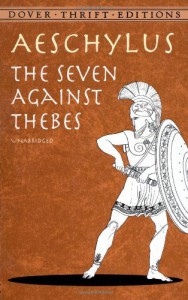The jealous rivalry of two brothers

When we come to Aeschylus we must remember that this is drama at its most primitive. This is because the works of Aeschylus are the oldest form of drama that remains extant. It appears that Aeschylus wrote most of his plays as trilogies, and unfortunately we only have one play of this trilogy available. It is difficult to know what exactly was the reason why only seven plays of Aeschylus were chosen to be preserved, and why these particular plays were chosen. The only complete trilogy we have is the Orestea, however it is clear, of the other four plays that we have, at least three of them are parts of a trilogy.
It is suggested that this one is the final part of a trilogy most likely dealing with the story of Oedipus. I am not quite convinced that this is the final play because it appears that the end of this play will then follow on to the despite between Antigone and Creon (as the king is named in the Sophoclean play) over whether it is lawful or unlawful for Antigone to bury her brother. I suspect that the first play dealt with Oedipus returning to Thebes and discovering that he has inadvertently fulfilled the prophecy by killing his father and marrying his mother, and then gouging his eyes out and sending himself into exile. This would be the second: it begins rather abruptly and ends rather abruptly. Unlike other plays, there is not much detail of what happened before, and there is a flagging reference at the end that things have not necessarily been solved.
The play begins with the city of Thebes under siege. Oedipus had two sons: one of them is Etocles, who remained in the city and became king; the other is Polyneices, who after having a dispute with Etocles, went into exile, and returned with six heroes to attempt to depose his brother. A bulk of the play deals with Etocles conversing with either the chorus or soldiers, though the end has Antigone come in with Ismene. However, while there are at times three actors on the stage, only two of them ever converse. It does not appear that proper dialogue between multiple characters had at this stage been developed.
Some have criticised this play for having nothing happen, and then refer to Shakespeare and say 'look at how much better he is'. This, in my opinion, is a very bad method of comparing plays. First of all, this is not Shakespeare, this is Aeschylus, and secondly, the two playwrights live at least 1000 years apart. By the time we arrive at Shakespeare a lot had changed and drama had developed significantly. Back here in the days of Aeschylus, drama was very much still an advanced form of storytelling, and we can see that in this play. Basically there is no action occurring on stage, it is all dialogue, but the dialogue is painting a picture of what is occurring off stage. There is no battle on stage: this is not what Greek drama was about. There was dancing, and that was the role of the chorus, and I also believe that most of the story was sung, not spoken.
We do see a form of character interaction a couple of times in the play. Etocles is attempting to calm the chorus of Theban woman down so as not to cause a panic, and later Antigone is debating with the chorus about giving proper rights for Polyneices. The play also ends with a city divided. The chorus splits in two, and half go off to join the side that agrees that Polyneices should be exposed and left for the birds, while the other half agree with Antigone that Polyneices should be buried. However this dispute is not resolved at the end of the play, which is why I suspect that this is not the end but the middle.
Still I found it more difficult to get into this play than I do with Euripides, but this is most likely because Euripides is the next generation of dramatist, where there are well developed character interactions and more debate among characters of ideas of woman's rights, human suffering, forgiveness, and repentance. While the three unities remain important, and the chorus is still present, we see that drama has made a step forward. Unfortunately we have very little else to assist us analysing how drama developed. Along with the three great tragedians, we also have the old comedy of Aristophanes, however after that we jump to a collection of fragments by Menander, and then to the farce of Terrance and Plautus. As for drama, there is a substantial gap of at least five-hundred years until we come to the writings of Seneca. After Seneca, we pretty much have nothing until the appearance of the mystery plays of the Middle Ages. However we know from the ruins that drama was incredibly popular: pretty much every ancient city in Roman times had a theatre. It is a shame that we have very little indication of what was actually performed in them.


